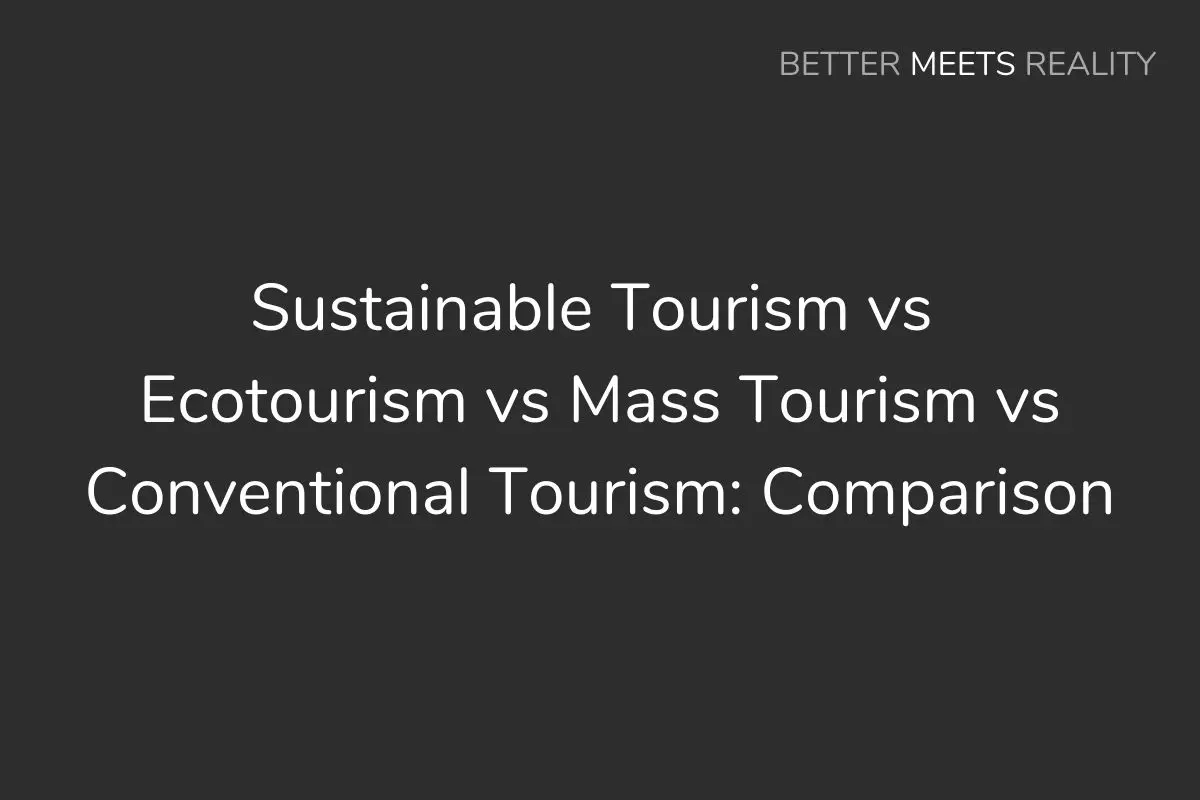Better Meets Reality
About Sustainability, & Related Topics & Issues


Sustainable Tourism vs Ecotourism vs Mass Tourism vs Conventional Tourism: Comparison
In this guide, we compare the main types of tourism – what they are, and differences between them.
Those types of tourism are sustainable tourism , ecotourism, mass tourism, and conventional tourism.
Comparison & Summary – Sustainable vs Eco vs Mass vs Conventional Tourism
– Sustainable Tourism
Involves economic, social and environmental considerations
– Ecotourism
Involves environmental, ecosystems, and wildlife considerations
– Mass Tourism
Involves the primary goal of making money for the tourism service provider, and the primary goals of experience, recreation and satisfying individual needs/wants by the tourist paying for the service.
Can involve mass numbers of tourists buying standardized commercial products/services.
There’s less of an emphasis, and sometimes no emphasis on sustainability.
– Conventional Tourism
Can involve mass tourism, but also includes non mass tourism in the form of custom and niche tourism too.
Conventional tourism may or may not have similar outcomes to mass tourism.
What Is Sustainable Tourism?
Sustainable tourism considers the short term and long term economic, social and environmental impact of tourism on all tourism stakeholders.
Examples Of Sustainable Tourism
– Aim to keep more money spent in tourism within the local economy, so that the local economy can sustain itself and even grow
Environment
– Prevent tourism destinations from experiencing critical levels of environmental degradation
This is especially important for attractions that are home to important ecosystems, biodiversity or wildlife
– Engage in other tourism or holidaying practices that generally have a neutral or positive impact on the environment
– Consider the needs, rights, and authentic culture of the locals within a geographic area that experiences tourism.
For example, the impact of waste generation on a tourist area, and the experience of the local that have to live there if waste management is poor
Another might be that local decision makers should consider the impact that resource use by tourists has on the local population if certain resources are scarce
What Is Ecotourism?
Ecotourism is a specialized concept of tourism placing specific emphasis on the short term and long term impact of tourism on the environment, ecosystems and wildlife.
It might aim to protect, or even expand environmental sites.
Ecotourism is included under the overall concept of sustainable tourism.
Examples Of Ecotourism
A few examples of ecotourism might be:
– A tourism service that helps preserve and protect a tropical rainforest
– A tourism service that helps run an ethical wildlife park or reserve
– A tourism service that helps preserve and protect an area with important biodiversity
What Is Mass Tourism?
Mass tourism includes but isn’t limited to:
– Tourism service/product providers maximizing financial gain as a primary goal (usually by servicing as many customers as possible, or by maximizing profits)
– Tourism consumers having recreation, experience, and individual needs and wants as a primary goal
– Large quantities of people usually buying the same standardized commercial tourism products and services, and primarily visiting the same tourism sites and destinations, or using the same tourism services
There’s usually little or no emphasis on sustainability with mass tourism.
Environmental degradation, and a lack of long term social and economic planning by local decision makers might be common to mass tourism
Issues that might be common to mass tourism might include:
Overcrowding, over saturation, congestion and large numbers of people and tourism products and services in one geographic area
Increased burden on local community, environment, and public services and infrastructure
A worser quality experience for tourists, and a worser daily quality of life experience for local residents
Short term profit focussed developments that become a long term liability
Leakage (of money spent in a tourism destination that leaks out of the local economy)
Hotels can be big users of water in water scarce places – resource sustainability concerns
Tourism in places with poor waste management can compound an existing issue
A host of environmental issues
Examples Of Mass Tourism
A few examples might include:
– Commercial/mass bus tours
– Commercial cruise ship/cruise liner trips
– Mass travel to, and overcrowding (quantity and density of people) of popular tourism destinations and sites
A real life example of mass tourism might be Venice in Italy – it attracts millions of visitors each year
What Is Conventional Tourism?
Conventional tourism is considered by some to be mass tourism, but, conventional tourism in reality can also involve tourism that doesn’t include mass production and consumerism.
Conventional tourism can include mass tourism, but can also include other types of tourism like personally planned, custom or niche tourism.
Consumers in particular might be looking for a specific type of trip or experience that takes their individual preferences into account.
Examples Of Conventional Tourism
– Mass tourism related activities
– Niche trips to rural areas to see historic sites of personal importance, or to experience local products and services like local food and beverages
– Planning and going on a custom travel trip not offered by, or purchased through a popular travel service provider
– Visiting family and/or friends domestically or overseas as part of a travel trip
1. Various ‘Better Meets Reality’ guides
Leave a Comment Cancel reply

What is the difference between mass tourism and ecotourism?
Mass tourism and ecotourism are two very different types of tourism that offer contrasting travel experiences. Mass tourism is often characterized as ‘traditional tourism’ and involves large groups of people visiting popular destinations, often for short periods. On the other hand, ecotourism is a responsible, sustainable form of tourism that promotes responsible travel to natural areas while simultaneously minimizing the negative impacts on the environment and engaging in the conservation of local communities.
Mass tourism primarily focuses on seeking entertainment and relaxation in an easy and popular way. It normally involves traveling to well-known destinations with the intention of visiting popular tourist attractions. Mass tourism is often linked to large chain hotels, luxury resorts, and cruise ships, which lead to economic benefits for businesses and local communities. However, it also has many negative impacts on the environment and local culture. The massive influx of tourists can cause over-crowding, littering, air and noise pollution, and the depletion of natural resources. Mass tourism seldom supports the local economy as most of the revenue generated by large hotel chains and tour operators goes back to their home countries, leaving the local community with very little profit.
In contrast, ecotourism emphasizes the cultural, social, and environmental interaction with the host community. It encourages travelers to immerse themselves into nature and engage with local people, thus forging connections with the local culture and better understanding the customs and traditions of the places they visit. Ecotourism aims to reduce the negative impacts on not only the physical environment but also on the local communities and indigenous cultures. It promotes responsible and sustainable tourism, with an emphasis on leaving no trace or minimal impact on the environments visited. Ecotourism fosters a respect for nature and the promotion of sustainable development, which leads to a conservation of the human, natural, and cultural resources of the destinations visited.
Overall, the core difference between mass tourism and ecotourism is that the former focuses on hedonistic consumer satisfaction and immediate reward, while the latter seeks out cultural and environmental enrichment and long-term sustainability. A significant challenge for the tourism industry is to move towards sustainable tourism and recognize the benefits of ecotourism. By doing so, tourists and the local communities are guaranteed a better future and a more harmonious relationship between people and nature.
Quick navigation
What are the main characteristics of mass tourism, and how do they differ from those of ecotourism?
Mass tourism is a type of tourism that involves the movement of large groups of people to a particular destination for leisure and recreational purposes. This type of tourism is characterized by its focus on providing standardized and pre-packaged experiences for visitors, which can often result in overcrowding at popular destinations. Mass tourism also tends to be driven by commercial interests, with the main goal being to generate profit.
In contrast, ecotourism is a form of sustainable tourism that focuses on responsible travel to natural areas that conserve the environment and improve the well-being of local communities. Ecotourism emphasizes on educating travelers about the natural and cultural environment, as well as promoting conservation efforts. The main characteristics of ecotourism are low-impact travel, small group sizes, and a focus on environmental and cultural preservation. Ecotourism emphasizes the importance of minimizing the negative impacts of tourism while maximizing the positive impacts, including development opportunities for local communities.
The main differences between mass tourism and ecotourism lie in their objectives and approaches. While mass tourism is driven by commercial interests and focuses on providing standardized experiences, ecotourism seeks to create more authentic experiences while promoting the conservation and well-being of the natural environment and local communities. Additionally, ecotourism is more sustainable and responsible, striving to minimize negative impacts on the environment and society while maximizing the positive.
In what ways does ecotourism benefit local communities and the natural environment, compared to mass tourism?
Ecotourism is a sustainable and responsible way of travelling that minimizes the impact of tourism on the environment and maximizes the benefits of tourism on local communities. It is a type of tourism that emphasizes the conservation of nature and the preservation of the natural environment. Compared to mass tourism, ecotourism benefits local communities and the natural environment in various ways.
Firstly, ecotourism generates income for the local community by providing opportunities for locals to participate in tourism activities such as guiding, food service, and handicrafts. The revenue generated from ecotourism is often spent locally, which creates jobs and stimulates the local economy. This contributes to poverty alleviation and enables local communities to improve their standard of living.
Secondly, ecotourism promotes conservation and preservation of the natural environment. By introducing visitors to the natural environment, ecotourism educates tourists about the environment. This enables tourists to cultivate an appreciation for the natural environment and understand the importance of protecting it. In turn, this encourages conservation efforts and leads to the preservation of natural habitats.
In conclusion, ecotourism benefits local communities and the natural environment by providing sustainable economic opportunities and promoting the conservation of nature. Ecotourism is a responsible way of travelling that should be encouraged and practiced by all those who are interested in travelling and exploring our beautiful planet.
How do tourists’ expectations and behaviors differ between mass tourism destinations and ecotourism destinations?
Tourists who visit mass tourism destinations generally have a lower level of cultural sensitivity and are less interested in local traditions and customs. As the emphasis is on consumption and entertainment, they often expect a lot of luxury and entertainment options. Tourists in mass tourism destinations are usually part of large groups or tour packages, which makes it difficult for them to have a unique and personalized experience. Their behavior can often be characterized by a lack of respect for the local environment, cultural insensitivity, and a disregard for the local community.
On the other hand, in ecotourism destinations, tourists tend to have a higher level of environmental awareness and an interest in sustainable tourism practices. Visitors to ecotourism destinations often have a strong interest in nature and adventure, and want to explore authentic local experiences. They usually seek out smaller group sizes and personalized experiences that allow them to learn about the local culture and environment while minimizing their impact on the ecosystem. The behavior of eco-tourists is characterized by their willingness to learn and respect the environment and the local customs and traditions, as well as contribute to the local economy.
In summary, tourists’ expectations and behaviors differ greatly between mass tourism and ecotourism destinations. Mass tourism destinations often offer a superficial and standardized experience, while ecotourism destinations offer a unique and authentic experience that prioritizes environmental sustainability and cultural sensitivity. By understanding these differences, tourism operators and destinations can better align their offerings with the expectations and behaviors of their visitors, and create a more sustainable and satisfying travel experience for everyone involved.
What challenges do destinations face in transitioning from mass tourism to ecotourism, and how can these challenges be overcome?
The growing concern over the environmental impact of mass tourism has led to a shift towards ecotourism as a more sustainable alternative. However, many destinations face challenges when trying to transition to ecotourism, particularly in developing countries. One of the biggest challenges is a lack of infrastructure. Developing ecotourism often requires investments in eco-friendly accommodations, transportation, and tourist facilities. These investments can be costly and may require support from the government or private investors. In addition, local communities may not have the necessary skills or knowledge to manage eco-tourism businesses, which can result in insufficient service quality and safety standards.
Another challenge is the perception of ecotourism as expensive and inaccessible to most travelers, as mass tourism has made travel more affordable and convenient. A shift to ecotourism means that destinations must cater to travelers who are looking for more authentic, nature-based experiences, rather than just traditional tourist attractions. This requires the development of unique and interesting eco-tourism products and services, which can compete with mass tourism offerings. It is also important to promote ecotourism as an affordable and accessible tourism option for all travelers.
To overcome these challenges, destinations can consider forming partnerships with local communities, NGOs, and private sector businesses to pool resources and share knowledge and experiences. Developing sustainable tourism strategies can also help to overcome the challenges of transitioning to eco-tourism by clearly outlining the steps needed to transition from mass tourism, outlining priorities for investment in infrastructure, and communication and partnerships. Finally, governments can incentivize private investments by creating favorable policies towards ecotourism development, such as tax incentives, land grants, and financial support. With the right approach and mindset, destinations can successfully transition from mass tourism to sustainable ecotourism benefiting locals, the environment and visitors alike.
How can travelers make informed decisions about choosing ecotourism options over mass tourism offerings?
As global attention focuses more on sustainability, travelers are becoming increasingly interested in eco-tourism options and seeking out more responsible, sustainable travel choices. With the growth of the travel industry, it is important for travelers to become more informed in their decision making by evaluating the options and choosing eco-tourism alternatives over mass tourism offerings. The best way to do that is by taking into consideration several factors such as the company’s mission statement, the tour activities, the location’s eco-footprint and culture preservation efforts, and environmental impact as well as the type of travel transportation chosen.
When choosing an eco-tourism option, travelers must take a keen interest in studying the mission and values of the company. They must research the company’s policy on reducing its environmental impact as well as their ethics and commitment to the local community. The second factor to consider is activities of the tour. The activities should be eco-friendly and sustainable, such as animal watching, hiking, and supporting local communities through purchasing local products and experiencing local culture. Finally, travelers should consider the location’s eco-footprint, the preservation efforts of the environment and culture and look for ways they can reduce their environmental footprint by traveling through sustainable transportation options.
In conclusion, for travelers to make informative decisions about eco-tourism options over mass tourism offerings, they must be interested in understanding the company’s mission and values, tour activities, location’s eco-footprint and culture preservation efforts, and environmental impact as well as choosing responsible transport options. Travelers can also support eco-friendly tourism options by sharing their experiences and encouraging others to do the same and creating a positive impact when traveling.
Related Posts
Why is it called surprise, arizona, is gilbert, arizona a good place to retire, does tempe, arizona get snow.
Sustainable Tourism vs. Ecotourism: What's the Difference?
If you're starting to research more ways to become a more responsible traveler, you're bound to run across terms like "sustainable tourism,” "ecotourism," and "voluntourism,” sometimes even used interchangeably. But what do they all mean? In reality, ecotourism refers to the sector of low-impact tourism that includes natural areas, whereas sustainable tourism is a broader term describing sustainable practices within and performed by the tourism industry.
The environmental damages that can stem from irresponsible tourism have continued to come to light through complications from overtourism (when a destination or attraction suffers from overcrowding or an excess of tourists it isn’t designed to handle) and land degradation (when increased construction of tourism infrastructure negatively affects land resources and biodiversity). These terms are more than just travel industry buzzwords; sustainable travel is—hopefully—here to stay.
What Is Sustainable Tourism?
Sustainable tourism encompasses all forms of tourism that consider the long-term economic, social, and environmental impacts of tourism while addressing the needs of visitors, the environment, host communities, and the tourism industry itself. According to the Global Sustainable Tourism Council (GSTC)—an organization that sets global standards for sustainable travel and tourism—sustainable tourism doesn’t refer to a specific type of tourism but is rather an aspiration for the impacts of all forms of tourism.
Specifically, "sustainable tourism takes full account of its current and future economic, social and environmental impacts, addressing the needs of visitors, the industry, the environment, and host communities." This includes conservation efforts, preserving cultural heritage and traditional values, and providing equitably distributed socio-economic benefits.
Destinations and industries may practice sustainable tourism by prioritizing the natural environment when developing activities and infrastructure, respecting the cultural practices of host communities, and ensuring long-term economic operations to support the destination, to name a few.
Adopting a few sustainable practices into your travel routine isn’t just a win for the people, environments, and wildlife of your destination, it can often create more educational, meaningful, and authentic tourism experiences at the same time. Individual travelers can do things like buy locally made souvenirs, opt for public transportation instead of rental cars, buy an admission ticket to a protected conservation area (like a national park), or go low-impact camping to show their support for sustainable tourism.
What Is Ecotourism?
Sustainable tourism as a whole considers the economic, social, and environmental impacts of the travel industry, ecotourism tends to lean deeper into the environmental. The most cited definition of ecological tourism (or “ecotourism”) comes straight from the International Ecotourism Society (TIES), a nonprofit organization that’s been dedicated to promoting ecotourism since 1990. TIES defines ecotourism as “responsible travel to natural areas that conserves the environment, sustains the well-being of the local people, and involves interpretation and education.”
According to the United Nations World Tourism Organization (UNWTO), ecotourism refers to nature-based forms of tourism where the observation and appreciation of nature and traditional culture in natural areas is the main motivation behind traveling. Specifically, ecotourism has the following characteristics:
- Contains educational and interpretation features.
- Generally speaking, tours are organized by specialized, small-group tour operators.
- Destination partners are usually small, locally-owned businesses.
- Minimizes negative impacts on the natural and cultural environment.
- Supports the maintenance of areas used as ecotourism attractions.
This maintenance support is provided by the generation of income for communities, local organizations, and conservation management authorities as well as the availability of alternative employment opportunities and increased awareness of natural and culturally significant areas.
While ecotourism is just one of several different subsets of sustainable tourism, it tends to be the most widely recognized. Since it focuses primarily on experiencing and learning about nature, ecotourism should be managed in such a way that helps contribute to the conservation and preservation of those very areas. It goes farther than wildlife, and focuses on both environmental and cultural understanding of the natural places visited. For this reason, there are some communities and even entire habitats that completely rely on ecotourism as a means for survival.
For example, Palau in the South Pacific requires all visitors to sign an eco pledge before entering the country saying that they will act in a way that is both ecologically and culturally responsible for the sake of future generations of Palauans. Tourists can also look out for Palau Pledge Certified businesses to support companies that have made a commitment to sustainability. In Africa, many governments have safeguarded national parks and natural reserves that generate revenue for the local communities while keeping some of the world’s most iconic wildlife and ecosystems protected from extinction. In turn, nature-based tourism creates countless jobs and contributes funds to help manage these protected areas.
Other Types of Sustainable Tourism
Although ecotourism is a popular niche segment of sustainable tourism in natural areas, it's not the only one. Other forms of sustainable tourism highlight different priorities such as volunteer work, small businesses, and unique local experiences.
Voluntourism
Voluntourism involves tourists who travel for the specific purpose of volunteering, such as teaching English in a foreign country, working with a wildlife rescue center, or offering medical services to underdeveloped areas. Voluntourists can travel internationally or domestically, typically for a charity or non profit, participating in voluntourism programs that positively impact local communities and benefits destinations long-term.
Soft Tourism
Soft tourism (as opposed to hard tourism) is characterized by small-scale, locally owned and operated businesses that employ local community members, respect the local way of life and local traditions, and allow tourists to experience the truly unique aspects of a destination.
Hard tourism conversely focuses on large-scale mass tourism development, which often leads to negative impacts on the environment or keeps money out of the local economies. Soft tourism typically values experiences over checking off the most popular tourist attractions, taking a class over traveling without gaining any in-depth knowledge about the destination, and spending more time in one spot over hitting a new city every couple of days.
Community Tourism
Community-based tourism puts a region's tourism industry into the hands of its local residents, and it is often sponsored by its governments or non profits with expertise in tourism development. Community members will manage homestays where tourists can get an authentic experience of local culture, become tour guides, or provide other tourism services themselves rather than sourcing out to multinational or commercialized companies. This type of tourism is important because economic benefits usually go straight towards local families and stay within the community.
Global Sustainable Tourism Council. " GSTC Sustainable Tourism Glossary: Definitions of Important Terms ." 2021.
The International Ecotourism Society. " What Is Ecotourism ." 2019.
Is Thailand Ready to Reopen Its Borders to Tourists?
Regenerative Travel Brings Hotels Together for Environmental and Social Impact
Destinations Dependent on Ecotourism Are Facing a Silent Crisis
How to Travel Sustainably on a Budget
The Ongoing Debate of “Last Chance Tourism”
How to Choose an Ethical Wildlife Experience
How Tourism Boards in Southeast Asia Have Been Turning to Sustainable Travel
What Is Overtourism—And Why We Should Be Talking About It
Responsible Travel in Africa: The Complete Guide
Top Caribbean Ecotourism Destinations
This Spanish Island Is Betting on the Environment Instead of Tourism
How to Find an Ethical, Authentic Food Tour
The 14 Best Backpack Brands of 2024
The Rise of Wellness Tourism
The 8 Best Luggage Sets of 2024, Tested and Reviewed
Slum Tourism: What Is It, and Is It Okay?
What is the difference between eco tourism and mass tourism?

Unveiling the Beauty of Eco Tourism 🍃
The bustling world of mass tourism 🌍, eco vs mass tourism: a side by side comparison 🔄, comparison between eco tourism and mass tourism.
Eco Tourism vs Mass Tourism

Ethan Woods

Popular Articles

Reconnecting with Nature: Top Eco-Friendly Yoga Retreats for Mindful Travelers

Riding the Rails Sustainably: A Guide to Eco-Friendly Train Travel Across Continents

Exploring Environmentally Friendly Vacation Spots in South America: A Guide for Eco-Conscious Travelers

Best Self Guided Bike Tours in East Asia: An Eco-Friendly Way to Explore

Sustainable Seas: A Diver's Guide to Coral Reef Conservation Travel Experiences
Never miss a post, share this article, recent faqs, what are some eco-friendly travel activities for solo travelers, what are some eco-friendly travel activities that tourist eco recommends, what are some eco-friendly activities to do in popular tourist destinations that tourist eco recommends, what eco-friendly transportation options can be used to reach eco-tourism destinations, how can i support local communities and economies while practicing sustainable tourism, what are some recommended eco-friendly activities to do in popular tourist destinations, people also asked.

What are some tips for eco-friendly travel?

How can I make my travel more eco-friendly?

How can I make my travel more sustainable?

What are some tips for sustainable travel?

How can travelers support sustainable tourism efforts?

Who is responsible for promoting sustainable tourism?

How can sustainable tourism practices be encouraged?

How can hotels and resorts become more eco-friendly?
Tourist eco articles.

10 Must-Visit Eco-Friendly Travel Destinations for the Conscious Traveler

Exploring Green Travel Guidebooks: Your Essential Eco-Conscious Travel Companion

8 Inspiring Conservation-Focused Travel Experiences for the Eco-Minded Wanderer

Plastic-Free Travel: Tips and Tricks for Reducing Single-Use Plastic While on the Road
Login to tourist eco.

Mass Tourism vs Sustainable Tourism: Comparison for Eco-Friendly Traveling
As awareness of our environmental impact grows, the discussion around mass tourism versus sustainable tourism gains momentum. Both have their roles, but understanding their effects on our travel destinations is crucial. Are we benefiting the places we visit, or are we part of the problem? This piece delves into their differences, similarities, and the pros and cons, guiding you toward travel choices that are enjoyable and responsible.
Table of Contents
What is mass tourism and what is sustainable tourism?
Mass tourism is when numerous tourists flock to a destination simultaneously. It’s characterized by large groups, often attracted by affordable, easy-to-book travel packages from big companies. While convenient and budget-friendly, this tourism style can overburden local resources, harm the environment, and disrupt community life.
Contrastingly, sustainable tourism is the considerate alternative, focusing on the long-term effects of travel on destinations. It aims to reduce negative impacts and enhance positive contributions to local cultures and economies. Choosing this path means aiding in the preservation of destinations for the future, a step towards supporting local economies .
Key differences between mass tourism and sustainable tourism
- Visitor numbers: Mass tourism draws large crowds, whereas sustainable tourism advocates for fewer, more manageable visitor numbers.
- Environmental impact: Mass tourism can cause significant ecological damage, while sustainable tourism strives to reduce such impacts.
- Economic contribution: Mass tourism might not always benefit local economies significantly, unlike sustainable tourism, which seeks to bolster local economic growth.
- Cultural interaction: Tourists in mass tourism scenarios often engage with local cultures superficially, whereas sustainable tourism encourages meaningful cultural interactions.
- Longevity: Mass tourism is about immediate benefits, whereas sustainable tourism focuses on long-term viability, an approach that often requires more investment .
Key similarities between mass tourism and sustainable tourism
Despite their differences, both tourism types share some commonalities:
- Travel motivation: Both cater to people’s desire to explore and experience new cultures.
- Economic impact: They both contribute to local and global economies.
- Resource usage: Both require resources like accommodation and transportation, albeit in different manners.
- Job creation: They generate employment in the destinations they touch.
- Cultural exchange: Both forms of tourism facilitate cultural exchanges, though sustainable tourism does so more respectfully and often involves more planning and research .

Pros of mass tourism over sustainable tourism
- Ease of planning: Mass tourism’s pre-arranged packages simplify travel, offering a straightforward, hassle-free experience for tourists.
- Cost-effectiveness: Leveraging economies of scale, mass tourism can be more budget-friendly, making travel more accessible to a broader audience.
- Economic boost: In the short term, mass tourism can inject substantial financial resources into local economies, increasing demand for services and goods.
- Global awareness: Exposure to different regions through mass tourism can broaden knowledge and understanding of diverse cultures.
- Job creation: Especially during peak seasons, mass tourism can generate numerous employment opportunities, albeit often temporary.
Cons of mass tourism compared to sustainable tourism
- Environmental strain: The high volume of tourists can lead to pollution, littering, and harm to natural habitats.
- Overcrowding: Popular destinations may suffer from excessive tourist numbers, putting pressure on local infrastructure and resources.
- Cultural superficiality: There’s a risk of shallow engagement with local traditions and customs, potentially leading to misunderstandings or disrespect.
- Seasonal employment: The jobs created are frequently seasonal, offering limited long-term security for residents.
- Economic disparity: The profits from mass tourism don’t always benefit the local community directly and may not contribute to conservation efforts.
Pros of sustainable tourism over mass tourism
- Environmental stewardship: Sustainable tourism prioritizes ecological preservation, aiming to minimize tourism’s footprint and promote conservation.
- Cultural depth: It fosters a profound appreciation and respect for local traditions, aiding in their preservation for future generations.
- Local prosperity: This tourism model ensures a more significant portion of financial benefits remains within the community, supporting local enterprises.
- Quality experiences: Focusing on meaningful interactions rather than sheer visitor volume, sustainable tourism offers enriching and memorable experiences.
- Stable employment: By promoting tourism outside peak seasons and diversifying attractions, sustainable tourism can offer more consistent job opportunities.
- Educational opportunities: Tourists often gain insights into environmental conservation and cultural respect, enhancing the trip’s value beyond mere leisure.
Cons of sustainable tourism compared to mass tourism
- Higher costs: Implementing sustainable practices can be more expensive, which might translate to higher prices for travelers, contrasting with the cost-effectiveness of mass tourism.
- Limited spots: To avoid overtaxing resources, sustainable tourism might cap the number of visitors, which could make securing a spot more challenging.
- More planning required: Without the convenience of pre-packaged deals, travelers might need to invest extra effort into organizing their sustainable trips.
- Accessibility issues: Not all destinations offer sustainable options, potentially limiting choices for eco-conscious travelers.
- Growth pace: The focus on long-term benefits in sustainable tourism might mean slower immediate growth compared to the rapid expansion seen in mass tourism.
- Infrastructure: Some sustainable destinations might lack the extensive infrastructure that mass tourism spots offer, which could affect convenience for travelers.
Situations when mass tourism is preferable
- Budget constraints: For those prioritizing affordability, mass tourism’s cost-effective options can be more appealing.
- Limited planning time: The ready-made packages of mass tourism are ideal for travelers with little time to arrange their journeys.
- Popular attractions: If visiting well-known landmarks is a priority, mass tourism might offer more straightforward access to these sites.
- First-time travelers: The structured nature of mass tourism can provide a sense of security and ease for novice travelers.
- Large group travel: Coordinating travel for many people can be simpler with mass tourism’s group-friendly options.
Situations when sustainable tourism is the better choice
- Environmental concern: Travelers passionate about conservation should lean towards sustainable tourism to align with their values.
- Seeking authenticity: For a more genuine and immersive experience, sustainable tourism offers unique insights into local life and culture.
- Cultural engagement: Those looking to deeply connect with local communities will find sustainable tourism more fulfilling.
- Avoiding crowds: Travelers preferring tranquility and less congested destinations will benefit from the ethos of sustainable tourism.
- Economic impact: Choosing sustainable tourism supports local economies more directly, ensuring that tourism benefits are more evenly distributed.
- Educational aspect: For those looking to learn about environmental conservation and cultural preservation, sustainable tourism provides valuable learning opportunities.
By considering these factors, travelers can make informed decisions that align with their preferences, budget, and values, ensuring a more fulfilling and responsible travel experience.
Mass Tourism vs Sustainable Tourism Summary
In our exploration of mass versus sustainable tourism, we’ve dissected their benefits and drawbacks. Your choice hinges on personal needs and values. Yet, as we strive to be more conscientious travelers, pondering the long-term effects of our journeys is vital. Opting for sustainable tourism ensures the preservation of our treasured destinations for posterity. Travel is about celebrating and respecting our world, not depleting it.

About The Author
Jessica Patterson
Leave a comment cancel reply.
Your email address will not be published. Required fields are marked *
Save my name, email, and website in this browser for the next time I comment.

FLY RIGHT PASS THE CROWD
Listen to any book ever published, get started for free.


What Is the Difference Between Mass Tourism and Ecotourism?
By Alice Nichols
When it comes to tourism, two terms that are often heard are ‘mass tourism’ and ‘ecotourism’. While both involve traveling to different destinations for leisure, they are vastly different in terms of their impact on the environment and local communities. Let’s dive into the differences between mass tourism and ecotourism.
Mass Tourism
Definition: Mass tourism refers to the act of traveling to popular tourist destinations in large numbers for leisure purposes. It is characterized by standardized accommodations, transportation, and activities that cater to a large number of tourists.
Impact: Mass tourism has several negative impacts on both the environment and local communities. The high influx of tourists can lead to overcrowding, which results in increased pollution levels, strain on resources like water and electricity, and damage to natural ecosystems. The pressure for development can also lead to the destruction of local heritage sites or cultural practices.
- All-inclusive resorts
- Cruise ships
- Theme parks
- Crowded beaches
Definition: Ecotourism refers to a type of responsible travel that focuses on experiencing natural areas while preserving them. It is characterized by small-scale accommodations, low-impact transportation methods like biking or hiking, and activities that involve learning about nature or local cultures.
Impact: Ecotourism has a positive impact on the environment and local communities. By prioritizing conservation efforts, it helps protect natural habitats and wildlife while minimizing negative impacts like pollution or habitat destruction. Additionally, it provides economic benefits to local communities through employment opportunities or support for small businesses.
- Hiking or camping in national parks
- Volunteer programs for conservation efforts
- Visiting local communities and supporting their businesses
- Wildlife safaris
9 Related Question Answers Found
What is the meaning of mass tourism, what are the main characteristics of mass tourism, what is considered mass tourism, what are the characteristics of mass tourism, what is an example of mass tourism, what are some characteristics of mass tourism, what is the difference between tourism and ecotourism, what is mass tourism, what is the difference between sustainable tourism and ecotourism, backpacking - budget travel - business travel - cruise ship - vacation - tourism - resort - cruise - road trip - destination wedding - tourist destination - best places, london - madrid - paris - prague - dubai - barcelona - rome.
© 2024 LuxuryTraveldiva
- Living reference work entry
- First Online: 06 October 2022
- Cite this living reference work entry

- Valeriya Shapoval 2
28 Accesses
This chapter provides an overview of ecotourism, the history of its definition, most recent research, and current trends, specifically most recent trends where ecotourism is evaluated as part of mass tourism and its mutual benefits, and overviews who are ecotourists, their demographics, and their generational makeover. Evaluating ecotourism is part of ACE (Adventure, Cultural, and Ecotourism), nature-based, sustainable, and wildlife tourism. Conservationism and ethics are essential parts of ecotourism. Evaluation of ecotourism principles’ barriers enables ecotourism at destinations. This chapter covers essential points of learning and ethics of ecotourism and if it really makes a difference at destinations in its ultimate goal of preserving nature and local communities. It also covers the proposition of the idea that ecotourism is, in fact, a part of slow tourism as much as a part of all other dimensions of tourism, predispositions of ecotourism, and influence of government tourism policies and their impact. The conclusion provides a summary and gaps in academic research.
This is a preview of subscription content, log in via an institution to check access.
Access this chapter
Institutional subscriptions
Allied Market Research (2021) Ecotourism market by traveler type, age group, and sales channel: global opportunity analysis and industry forecast 2021–2027. https://www.alliedmarketresearch.com/eco-tourism-market-A06364
Aryal C, Ghimire B, Niraula N (2019) Tourism in protected areas and appraisal of ecotourism in Nepalese policies. J Tour Hosp Educ 9:40–73
Google Scholar
Booking.com (2019, April 17). Booking.com reveals key findings from its 2019 sustainable travel report. https://globalnews.booking.com/bookingcom-reveals-key-findings-from-its-2019-sustainable-travel-report/
Brandt JS, Buckley RC (2018) A global systematic review of empirical evidence of ecotourism impacts on forests in biodiversity hotspots. Curr Opin Environ Sustain 32:112–118
Article Google Scholar
Caffyn A (2012) Advocating and implementing slow tourism. Tour Recreat Res 37(1):77–80
Cecil AN (2002) ACE tourism: trekking in Nepal (Publication no. 312). Honors in the major thesis, University of Central Florida]. HIM 1990–2015. https://stars.library.ucf.edu/honorstheses1990-2015/312
Das M, Chatterjee B (2020) Community empowerment and conservation through ecotourism: a case of Bhitarkanika Wildlife Sanctuary, Odisha, India. Tour Rev Int 24(4):215–231
de Grosbois D, Fennell DA (2021) Sustainability and ecotourism principles adoption by leading ecolodges: learning from best practices. Tour Recreat Res 1–16
Dickinson JE, Robbins D, Lumsdon L (2010) Holiday travel discourses and climate change. J Transp Geogr 18(3):482–489
Dolnicar S, Crouch GI, Long P (2008) Environment-friendly tourists: what do we really know about them?. J Sustain Tour 16(2):197–210
Ecotourism, Social Justice and Sustainability. Fullagar S, Markwell K, Wilson, E. (Eds.). (2012). Slow tourism: Experiences and mobilities (Vol. 54). Channel View Publications
Fennell DA (2001) A content analysis of ecotourism definitions. Curr Issue Tour 4(5):403–421
Fennell DA (2007) Ecotourism, 3rd edn. Routledge
Book Google Scholar
Fennell DA (2013) Ecotourism and ethics. In: Ballantyne R, Packer J (eds) International handbook on ecotourism. Edward Elgar
Fennell DA (2020) Ecotourism, 5th edn. Routledge
Fennell DA (2021) Technology and the sustainable tourist in the new age of disruption. J Sustain Tour 29(5):767–773
Global Sustainable Tourism Council (n.d.) The difference between ecotourism and sustainable tourism. https://www.gstcouncil.org/ecotourism/
Hill JL, Gale T (eds) (2009) Ecotourism and environmental sustainability: principles and practice. Ashgate Publishing
Holden A (2007) Environment and tourism. London: Routledge
Holtz C, Edwards S (2003) Linking biodiversity and sustainable tourism policy. In: Fennell DA, Dowling RK (eds) Ecotourism policy and planning. CABI Publishing, pp 39–54
Chapter Google Scholar
Honoré C (2009) In praise of slow: how a worldwide movement is challenging the cult of speed. Vintage Canada
Kaihatu TS, Spence MT, Kasim A, Satrya IDG, Budidharmanto LP (2020) Millennials’ predisposition toward ecotourism: the influence of universalism value, horizontal collectivism and user generated content. J Ecotour 20(2):1–20
Lee TH, Jan FH (2018) Ecotourism behavior of nature-based tourists: an integrative framework. J Travel Res 57(6):792–810
Lock S (2021) Ecotourism market size worldwide 2019–2027. Statista. https://www.statista.com/statistics/1221034/ecotourism-market-size-global/
Machura L (1954) Nature protection and tourism: with particular reference to Austria. Oryx 2(5):307–311
Newsome D (2020) The collapse of tourism and its impact on wildlife tourism destinations. J Tour Fut
Nino K, Mamo Y, Mengesha G, Kibret KS (2017) GIS based ecotourism potential assessment in Munessa Shashemene Concession Forest and its surrounding area, Ethiopia. Appl Geogr 82:48–58
Nowaczek A, Smale B (2010) Exploring the predisposition of travelers to qualify as ecotourists: the ecotourist predisposition scale. J Ecotourism 9(1):45–61
Reynolds PC, Braithwaite D (2001) Towards a conceptual framework for wildlife tourism. Tour Manag 22(1):31–42
Risbud A (2019, July 3) Eco-tourism is not just for greenies. Nielsen Solutions Research. https://www.nielsen.com/au/en/insights/article/2019/eco-tourism-is-not-just-for-greenies/
Saatsakis I (2018) Ecotourism: an environmental concern or a new diversification of the mass tourism market, the case of Crete. Doctoral dissertation, Buckinghamshire New University, validated by Brunel University. Guildhe Research Repositories
Stankov U, Stojanović V, Dragićević V, Arsenović D (2011) Ecotourism: an alternative to mass tourism in nature park “Stara planina”. J Geogr Instit 61(1):43–59
Stronza AL, Hunt CA, Fitzgerald LA (2019) Ecotourism for conservation? Annu Rev Environ Resour 44:229
The International Ecotourism Society (2015, January 7) TIES announces ecotourism principles revision. https://ecotourism.org/news/ties-announces-ecotourism-principles-revision/
Trave C, Brunnschweiler J, Sheaves M, Diedrich A, Barnett A (2017) Are we killing them with kindness? Evaluation of sustainable marine wildlife tourism. Biol Conserv 209:211–222
Treephan P, Visuthismajarn P, Isaramalai SA (2019) A model of participatory community-based ecotourism and mangrove forest conservation in Ban Hua Thang, Thailand. Afr J Hosp Tour Leis 8(5):1–8
Vanhove N (1997) Mass tourism. In: Pigram JJ, Wahab S (eds) Tourism, development and growth: the challenge of sustainability. Routledge, pp 50–77
Wearing S, Wearing M, McDonald M (2012) Slow’n down the town to let nature grow: ecotourism, social justice and sustainability. In: Fullagar S, Markwell K, Wilson E (eds) Slow tourism: experiences and mobilities, vol 54. Channel View Publications
Weaver DB (1999) Magnitude of ecotourism in Costa Rica and Kenya. Ann Tour Res 26(4):792–816
Weaver DB (2002) Asian ecotourism: patterns and themes. Tour Geogr 4(2):153–172
Weinberg A, Bellows S, Ekster D (2002) Sustaining ecotourism: insights and implications from two successful case studies. Soc Nat Resour 15(4):371–380. https://doi.org/10.1080/089419202753570846
Wheeler M (1994) The emergence of ethics in tourism and hospitality. In: Cooper CP, Lockwood A (eds) Progress in tourism, recreation and hospitality management, vol 6. Wiley, pp 46–56
World Travel and Tourism Council (2019) The economic impact of global wildlife tourism: travel and tourism as an economic tool for the protection of wildlife. https://travesiasdigital.com/wp-content/uploads/2019/08/The-Economic-Impact-of-Global-Wildlife-Tourism-Final-19.pdf
Wunder S (1999) Promoting forest conservation through ecotourism income. A case study from the Ecuadorian Amazon region. CIFOR occasional paper, 21. Center for International Forestry Research
Zanotti L, Chernela J (2008) Conflicting cultures of nature: ecotourism, education and the Kayapó of the Brazilian Amazon. Tour Geogr 10(4):495–521
Download references
Author information
Authors and affiliations.
Rosen College University of Central Florida, Orlando, FL, USA
Valeriya Shapoval
You can also search for this author in PubMed Google Scholar
Corresponding author
Correspondence to Valeriya Shapoval .
Rights and permissions
Reprints and permissions
Copyright information
© 2021 The Author(s), under exclusive licence to Springer Nature Switzerland AG
About this entry
Cite this entry.
Shapoval, V. (2021). Ecotourism. In: The Palgrave Handbook of Global Sustainability. Palgrave Macmillan, Cham. https://doi.org/10.1007/978-3-030-38948-2_127-1
Download citation
DOI : https://doi.org/10.1007/978-3-030-38948-2_127-1
Received : 26 June 2021
Accepted : 15 July 2021
Published : 06 October 2022
Publisher Name : Palgrave Macmillan, Cham
Print ISBN : 978-3-030-38948-2
Online ISBN : 978-3-030-38948-2
eBook Packages : Springer Reference Earth and Environm. Science Reference Module Physical and Materials Science Reference Module Earth and Environmental Sciences
- Publish with us
Policies and ethics
- Find a journal
- Track your research
Winter is here! Check out the winter wonderlands at these 5 amazing winter destinations in Montana
- Travel Guide
- Sustainability
What Is The Difference Between Ecotourism And Sustainable Tourism?
Published: November 14, 2023
Modified: December 28, 2023
by Dorelle Landers
- Plan Your Trip
Introduction
As our world becomes more aware of the environmental impact of various industries, the tourism sector is no exception. In recent years, there has been a rise in the popularity of ecotourism and sustainable tourism as travelers look for ways to explore the world while minimizing their impact on the environment and supporting local communities.
Both ecotourism and sustainable tourism share the common goal of promoting responsible travel practices, but they have distinct differences in their approaches and principles. Understanding these differences can help travelers make informed choices and contribute to a more sustainable and responsible tourism industry.
In this article, we will explore the definitions of ecotourism and sustainable tourism, discuss their key principles, compare the two concepts, and examine the benefits and challenges associated with each.
So, let’s dive into the world of ecotourism and sustainable tourism, and discover how we can travel in a way that is both fulfilling and gentle on the planet.
Definition of Ecotourism
Ecotourism, also known as ecological tourism, is a type of tourism that focuses on visiting natural and undisturbed areas while minimizing the impact on the environment and promoting conservation efforts. It encompasses responsible travel to fragile, pristine, and often remote destinations, with an emphasis on educating travelers about the environment and local cultures.
Ecotourism aims to provide unique experiences that are in harmony with nature, fostering an appreciation for the natural world and the need for its protection. It promotes sustainable practices by supporting local communities, conserving biodiversity, and preserving the cultural integrity of the destinations.
There are several key principles that define ecotourism:
- Nature Conservation: Ecotourism places a strong emphasis on conserving and protecting natural habitats, ecosystems, and wildlife. It seeks to minimize negative impacts, such as habitat destruction, pollution, and disturbance to wildlife populations.
- Educational Component: Ecotourism aims to educate visitors about the environment, local cultures, and the importance of conservation. It provides opportunities for guided tours, nature walks, and informative activities that promote an understanding of the natural and cultural value of the destination.
- Community Involvement: Ecotourism strives to involve and empower local communities in decision-making processes, as well as benefitting economically from sustainable tourism practices. It promotes fair wages, local employment, and the development of community-based tourism initiatives that preserve cultural heritage.
- Sustainable Practices: Ecotourism seeks to minimize its environmental footprint by adopting sustainable practices such as waste management, energy conservation, and responsible water usage. It encourages the use of locally sourced and organic products, as well as minimizing the use of plastic and other non-biodegradable materials.
- Responsible Tourism: Ecotourism promotes responsible travel behavior, including respecting local customs, traditions, and the environment. Travelers are encouraged to minimize waste, reduce their carbon footprint, and support local businesses and artisans.
Overall, ecotourism offers a way for travelers to connect with nature, learn about different cultures, and contribute to the preservation of our planet’s precious resources. It offers a sustainable alternative to conventional tourism and helps foster a greater appreciation for the natural world.
Definition of Sustainable Tourism
Sustainable tourism is a concept that aims to minimize the negative impacts of tourism on the environment, economy, and local communities, while maximizing the benefits for all stakeholders involved. It involves the development and operation of tourism activities that are environmentally friendly, socially responsible, and economically viable in the long term.
At its core, sustainable tourism seeks to achieve a balance between meeting the needs of visitors and preserving the natural and cultural assets of a destination for future generations. It takes into consideration the interconnectedness between environmental, social, and economic factors, promoting sustainable development and fostering a positive relationship between tourism and the host community.
The key principles of sustainable tourism include:
- Environmental Protection: Sustainable tourism places a strong emphasis on protecting the natural environment and conserving biodiversity. It seeks to minimize pollution, reduce waste, and manage natural resources responsibly, ensuring the long-term sustainability of ecosystems and the well-being of wildlife.
- Social and Cultural Respect: Sustainable tourism respects and promotes the cultural authenticity and heritage of host communities. It encourages meaningful interactions between visitors and locals while fostering mutual respect and understanding. It also supports the preservation of cultural traditions and practices.
- Economic Benefits: Sustainable tourism aims to contribute to the local economy by generating income and employment opportunities for the host community. It encourages the development of sustainable businesses and sources of income, ensuring the equitable distribution of tourism-related benefits.
- Community Involvement: Sustainable tourism actively involves and engages local communities in decision-making processes, seeking their participation in tourism planning and development. It recognizes and respects their rights, traditions, and knowledge, empowering them to take ownership of tourism initiatives.
- Visitor Education and Awareness: Sustainable tourism promotes visitor education and awareness, encouraging travelers to understand and appreciate the environmental, social, and cultural impacts of their actions. It seeks to foster responsible travel behavior and promote sustainable practices among visitors.
Sustainable tourism strives to create a positive and lasting impact on the destination by balancing the needs of the environment, local communities, and visitors. It acknowledges the importance of preserving natural and cultural heritage, while ensuring the economic development and well-being of the communities involved.
By practicing sustainable tourism, travelers have the opportunity to explore new places, support local economies, and make a positive difference in preserving our planet’s natural wonders for future generations.
Key Principles of Ecotourism
Ecotourism follows a set of key principles that guide its practices and differentiate it from other forms of tourism. These principles not only ensure the sustainability and conservation of natural resources and cultural heritage but also aim to provide meaningful and enriching experiences for travelers. Let’s explore the key principles of ecotourism:
- Nature Conservation: Ecotourism places a high priority on conserving and protecting the natural environment. It seeks to minimize negative impacts, such as habitat destruction and pollution, and focuses on preserving biodiversity and ecosystems. Ecotourism operators collaborate with local communities and conservation organizations to implement sustainable practices.
- Educational Component: Ecotourism aims to educate visitors about the environment, ecology, and local cultures. It provides opportunities for guided nature walks, interactive experiences, and informative programs to create awareness and understanding of the natural and cultural value of the destination. By promoting education, ecotourism encourages visitors to become stewards of the environment.
- Community Involvement: Ecotourism actively involves and benefits local communities. It seeks to empower them by providing economic opportunities through employment, fair wages, and community-based tourism initiatives. Local communities also play a vital role in decision-making processes, allowing them to have a say in the development and management of ecotourism activities.
- Sustainable Practices: Ecotourism promotes sustainable practices to minimize its environmental impact. This includes proper waste management, energy conservation, responsible water usage, and the use of environmentally friendly products. Ecotourism operators often strive to reduce their carbon footprint and adopt eco-friendly transportation options to mitigate their impact on the environment.
- Responsible Tourism: Ecotourism promotes responsible travel behavior among visitors. This includes respecting local customs and traditions, following designated trails and paths to avoid disturbing flora and fauna, and supporting local businesses and artisans. Travelers are encouraged to minimize waste, reduce their use of single-use plastics, and leave a positive impact on the communities they visit.
By adhering to these key principles, ecotourism provides travelers with an opportunity to connect with nature, learn about different cultures, and contribute to the conservation of our planet’s natural resources. It offers a sustainable and responsible way of traveling that not only benefits the environment but also supports the socio-economic well-being of local communities.
Key Principles of Sustainable Tourism
Sustainable tourism is guided by several key principles that shape its practices and distinguish it from conventional tourism. These principles promote the conservation of the environment, support local communities, and ensure long-term socio-economic benefits. Let’s explore the key principles of sustainable tourism:
- Environmental Protection: Sustainable tourism prioritizes the preservation of the natural environment and seeks to minimize its impact. It promotes sustainable resource management, waste reduction and recycling, and the conservation of biodiversity and ecosystems. Sustainable tourism operators operate in an environmentally responsible manner to protect the destinations they serve.
- Social and Cultural Respect: Sustainable tourism respects and celebrates the cultural authenticity and heritage of host communities. It values the diversity of cultures and traditions and seeks to promote local customs, arts, and handicrafts. Sustainable tourism encourages positive interactions between visitors and locals, fostering mutual respect and understanding.
- Economic Benefits: Sustainable tourism aims to maximize economic benefits for local communities by creating employment opportunities and supporting local businesses. It encourages fair wages, responsible purchasing practices, and the equitable distribution of tourism-generated income. Sustainable tourism strives to contribute to the socio-economic development of host destinations.
- Community Involvement: Sustainable tourism actively involves and empowers local communities in decision-making processes and tourism planning. It values the input and perspectives of community members, allowing them to shape the development and management of tourism initiatives. Sustainable tourism initiatives also seek to enhance the well-being and empowerment of host communities.
- Visitor Education and Awareness: Sustainable tourism promotes visitor education and awareness about the environmental, social, and cultural impacts of tourism. It encourages travelers to learn about the destinations they visit, respect local customs, and adopt responsible travel behavior. By raising awareness among visitors, sustainable tourism aims to foster positive changes in travel habits.
By adhering to these key principles, sustainable tourism aims to create a positive and lasting impact on the environment, local communities, and travelers. It seeks to strike a balance between the economic benefits of tourism and the long-term preservation of natural and cultural heritage.
Through sustainable tourism, travelers have the opportunity to support local communities, protect the environment, and foster cultural preservation. By embracing sustainable practices and conscious decision-making, we can ensure that tourism benefits both the present and future generations.
Comparison between Ecotourism and Sustainable Tourism
While ecotourism and sustainable tourism share common goals of promoting responsible travel practices and minimizing the negative impacts of tourism, there are distinct differences between the two concepts. Let’s compare ecotourism and sustainable tourism to understand their unique characteristics:
Focus: Ecotourism primarily focuses on visiting natural and undisturbed areas, with an emphasis on conservation efforts and education about the environment. Sustainable tourism, on the other hand, has a broader scope and considers the interconnectedness of environmental, social, and economic aspects of tourism.
Principles: Ecotourism emphasizes nature conservation, educational experiences, community involvement, sustainable practices, and responsible tourism. Sustainable tourism shares similar principles but also highlights the importance of environmental protection, cultural respect, economic benefits for communities, and visitor education and awareness.
Target Destinations: Ecotourism typically involves traveling to remote, natural areas such as national parks, wildlife reserves, and eco-lodges. Sustainable tourism can encompass a wider range of destinations, including cities, cultural sites, and natural areas, as long as sustainable practices are promoted.
Educational Component: Ecotourism places a strong emphasis on providing educational experiences to visitors, aimed at increasing awareness and understanding of the environment and local cultures. While sustainable tourism also values education, it may have a broader focus on raising awareness about various sustainability issues beyond the natural environment.
Community Involvement: Both ecotourism and sustainable tourism prioritize community involvement and empowerment. However, ecotourism specifically focuses on engaging local communities in decision-making processes and economic benefits derived from tourism activities. Sustainable tourism also emphasizes these aspects but may have a broader approach to community involvement beyond the specific context of ecotourism.
Scope of Sustainability: Ecotourism heavily emphasizes environmental sustainability and the conservation of natural resources. Sustainable tourism, while also valuing environmental sustainability, takes a more holistic approach by considering social and economic factors as well.
Overall Goals: The main goal of ecotourism is to promote responsible travel practices that conserve nature, educate visitors, support local communities, and minimize environmental impacts. Sustainable tourism, on the other hand, seeks to achieve sustainability in the tourism industry by balancing environmental responsibility, social and cultural respect, and economic benefits for all stakeholders.
It’s important to note that ecotourism can be seen as a subset of sustainable tourism, as it focuses specifically on nature-based experiences and conservation efforts. Both concepts have their unique strengths and approaches, but they ultimately share the common goal of promoting responsible and sustainable travel practices.
Benefits of Ecotourism
Ecotourism offers a range of tangible and intangible benefits for travelers, local communities, and the environment. Let’s explore some of the key benefits of ecotourism:
Conservation and Biodiversity: Ecotourism plays a vital role in conserving natural habitats and protecting biodiversity. By visiting ecologically sensitive areas, travelers contribute to the preservation of fragile ecosystems and support conservation efforts. Ecotourism also raises awareness about the value of biodiversity, fostering a sense of responsibility towards the natural world.
Educational Experiences: Ecotourism provides educational opportunities for travelers, offering a deeper understanding of environmental issues, local cultures, and conservation efforts. Travelers can learn about sustainable practices, the significance of ecosystems, and the challenges faced by local communities. Such educational experiences foster a greater appreciation for the environment and inspire individuals to be more environmentally conscious.
Support for Local Communities: Ecotourism generates economic benefits for local communities, creating employment opportunities and improving livelihoods. By engaging local people as guides, hosts, and suppliers, ecotourism supports the local economy and empowers communities. This economic boost helps to preserve cultural heritage and traditional practices, while also reducing the dependence on environmentally harmful activities.
Cultural Preservation: Ecotourism celebrates and preserves local cultures and traditions. Travelers have the opportunity to engage with indigenous communities, learn about their customs, and appreciate their unique way of life. By promoting cultural exchange and respecting local customs, ecotourism helps to safeguard and revitalize cultural heritage.
Environmental Stewardship: Ecotourism fosters a sense of environmental stewardship among travelers. By promoting sustainable practices, such as responsible waste management, energy conservation, and supporting eco-friendly initiatives, ecotourism encourages visitors to reduce their ecological footprint. This increased awareness and commitment to sustainability can have a positive ripple effect in other aspects of travelers’ lives.
Alternative Income Streams: Ecotourism provides communities with alternative income streams that are more sustainable and less damaging to the environment. This economic diversification helps reduce reliance on activities that may be harmful, such as deforestation or unsustainable agriculture. By offering viable economic alternatives, ecotourism provides incentives for communities to protect natural resources and foster long-term sustainability.
Overall, ecotourism has the potential to create a win-win situation where travelers have unique and meaningful experiences, local communities benefit from economic opportunities, and the environment thrives through conservation efforts. By choosing ecotourism, travelers can contribute to positive change and make a difference in the places they visit.
Benefits of Sustainable Tourism
Sustainable tourism offers numerous benefits for travelers, local communities, and the environment. By adopting sustainable practices and promoting responsible travel, sustainable tourism contributes to a more balanced and equitable tourism industry. Let’s explore some of the key benefits of sustainable tourism:
Environmental Conservation: Sustainable tourism prioritizes the protection and preservation of the natural environment. By implementing sustainable practices, such as responsible waste management, energy efficiency, and carbon reduction, sustainable tourism reduces the negative impact on ecosystems. This conservation effort helps preserve biodiversity, protect fragile habitats, and mitigate climate change.
Socioeconomic Development: Sustainable tourism contributes to the socioeconomic development of local communities. By supporting local businesses, artisans, and service providers, sustainable tourism boosts the local economy and creates employment opportunities. This economic empowerment helps alleviate poverty, improve infrastructure, and enhance the overall quality of life for residents in the destination.
Cultural Preservation: Sustainable tourism respects and promotes the preservation of cultural heritage. It provides opportunities for travelers to engage with local communities, learn about their traditions, and support cultural preservation initiatives. By valuing and showcasing local customs, arts, and handicrafts, sustainable tourism helps sustain cultural identities and traditions that might otherwise be at risk of disappearing.
Community Empowerment: Sustainable tourism actively involves local communities in decision-making processes and encourages their participation in tourism development. By giving communities a voice and involving them in the planning and management of tourism activities, sustainable tourism empowers locals and fosters a sense of ownership. This involvement helps ensure that tourism benefits are distributed more equitably within the community.
Positive Travel Experience: Sustainable tourism provides travelers with unique and authentic experiences. By engaging with local cultures, traditions, and natural landscapes, travelers gain a deeper understanding and appreciation for the destinations they visit. Sustainable tourism promotes meaningful interactions between travelers and locals, resulting in more enriching and immersive travel experiences.
Long-Term Industry Viability: By prioritizing sustainability in its practices, sustainable tourism contributes to the long-term viability of the tourism industry. It helps protect destinations from the negative impacts of mass tourism, such as overdevelopment and resource depletion. Sustainable tourism ensures that future generations can continue to enjoy the beauty and cultural significance of these destinations.
In summary, sustainable tourism offers a wide range of benefits that go beyond the individual traveler’s experience. It helps protect the environment, supports local communities, preserves cultural heritage, and ensures the long-term sustainability of the tourism industry. By choosing sustainable tourism options, travelers actively contribute to positive change and make a lasting impact on the destinations they visit.
Challenges of Ecotourism
While ecotourism offers numerous benefits, it also faces several challenges that need to be addressed for its successful implementation. Understanding these challenges is important to ensure that ecotourism practices are sustainable and effective. Let’s examine some of the key challenges of ecotourism:
Degree of Impact: Ecotourism, despite its focus on sustainability, can still have negative environmental impacts. The increase in visitor numbers, particularly in sensitive areas, can lead to habitat degradation, soil erosion, and disturbance to wildlife. Balancing the need to promote ecotourism while minimizing ecological impact requires careful planning and management.
Visitor Awareness and Behavior: An essential challenge in ecotourism is promoting responsible visitor behavior. Some travelers may not fully understand the impact of their actions, leading to unsustainable practices such as littering, wildlife harassment, or damage to natural habitats. Educating and raising awareness among visitors about the importance of conservation and responsible travel is crucial to mitigate these challenges.
Infrastructure and Resource Management: Developing appropriate infrastructure is often a challenge in ecotourism destinations. Ensuring sustainable and low-impact infrastructure, including accommodations, transportation, and waste management facilities, can be complex and require significant investment. Efficient resource management, such as water and energy conservation, is also essential to minimize the ecological footprint of ecotourism operations.
Community Involvement and Benefit Sharing: Genuine community engagement is essential for the success of ecotourism. However, it can be challenging to ensure that local communities are adequately involved in decision-making processes and benefit economically from tourism activities. Balancing the needs and aspirations of communities with the preservation of the natural environment requires effective partnerships and collaboration.
Financial Viability: Establishing and maintaining financially viable ecotourism initiatives can be challenging, especially in remote areas with limited infrastructure and visitor access. The costs of implementing ecotourism practices, such as staff training, conservation efforts, and sustainable infrastructure, can often be higher than in traditional tourism. Securing funding and developing sustainable business models to support ongoing operations is a constant challenge for ecotourism stakeholders.
Greenwashing and Authenticity: The rise in popularity of ecotourism has led to concerns about greenwashing – the practice of falsely promoting activities or destinations as environmentally friendly. Ensuring the authenticity and credibility of ecotourism initiatives is crucial for building trust with travelers. Clear guidelines, certifications, and accountability mechanisms can help address these concerns and support genuine ecotourism practices.
Overcoming these challenges requires collaboration between stakeholders, including governments, local communities, tourism operators, and travelers. By addressing these challenges, we can ensure that ecotourism remains a sustainable and effective approach to tourism that contributes to environmental conservation, community development, and responsible travel.
Challenges of Sustainable Tourism
Sustainable tourism faces several challenges that need to be addressed to ensure its successful implementation and long-term viability. Overcoming these challenges is crucial to ensure that sustainable tourism remains effective in minimizing negative impacts and maximizing positive outcomes. Let’s explore some of the key challenges of sustainable tourism:
Balancing Environmental, Social, and Economic Priorities: One of the main challenges of sustainable tourism is finding a balance between environmental protection, social and cultural integrity, and economic benefits. Striking this balance requires careful planning and collaboration among stakeholders to ensure that all aspects of sustainability are adequately addressed.
Overcrowding and Overtourism: Some popular tourist destinations face challenges related to overcrowding and overtourism, which can result in the degradation of natural and cultural sites. Managing visitor numbers, distributing tourism flows, and implementing sustainable tourism practices are crucial to avoid the negative impacts associated with overcrowding and maintain the integrity of these destinations.
Sustainable Infrastructure and Resource Management: Developing and maintaining sustainable infrastructure, such as energy-efficient accommodations, waste management systems, and sustainable transportation, can be a challenge. Implementing innovative solutions and integrating sustainable practices into tourism infrastructure require investment, cooperation among stakeholders, and a long-term vision.
Education and Awareness: Promoting and ensuring visitor education and awareness about sustainable tourism practices is essential. Some travelers may not be fully aware of the impact of their actions or the importance of responsible travel behavior. Raising awareness through educational campaigns, information materials, and visitor engagement is crucial to change behavior and encourage sustainable travel practices.
Community Engagement and Empowerment: Involving local communities in decision-making processes, benefit sharing, and capacity building is vital for sustainable tourism. Establishing effective partnerships and empowering communities to actively participate in tourism planning and development can be challenging. Ensuring that local communities are key stakeholders and beneficiaries of sustainable tourism initiatives is crucial for their long-term success.
Funding and Financial Viability: Financial sustainability can be a significant challenge for sustainable tourism initiatives, especially in destinations with limited resources and infrastructure. Funding, investment, and revenue generation mechanisms need to be established to support the ongoing implementation of sustainable practices and ensure the economic viability of sustainable tourism initiatives.
Measuring and Monitoring Sustainability: Measuring and monitoring the sustainability performance of tourism activities and destinations is essential but can be challenging. Developing effective indicators, data collection methods, and monitoring frameworks is necessary to assess progress and identify areas for improvement in terms of environmental, social, and economic sustainability.
Addressing these challenges requires collaborative efforts from governments, tourism operators, local communities, and travelers. By overcoming these challenges, sustainable tourism can continue to evolve as a responsible and effective approach, contributing to the conservation of natural resources, cultural preservation, and the socioeconomic development of host communities.
Ecotourism and sustainable tourism offer valuable approaches to travel that prioritize responsible practices, environmental conservation, and community engagement. While ecotourism focuses on visiting natural areas and promoting conservation efforts, sustainable tourism takes a broader perspective by considering the environmental, social, and economic aspects of tourism.
Both concepts share common principles such as nature conservation, education, community involvement, sustainable practices, and responsible tourism behavior. They offer numerous benefits, including the preservation of biodiversity, cultural heritage, and the socioeconomic development of local communities.
However, these approaches also face challenges. Ecotourism’s challenges include managing the impact on fragile ecosystems, promoting responsible visitor behavior, and ensuring community involvement and benefit sharing. Sustainable tourism, on the other hand, encounters challenges in balancing priorities, managing overcrowding, and developing sustainable infrastructure.
Addressing these challenges requires collaborative efforts among all stakeholders involved in the tourism industry. Governments, tourism operators, local communities, and travelers need to work together to develop sustainable practices, educate visitors, empower local communities, and ensure the protection of natural and cultural resources.
By choosing ecotourism and sustainable tourism options, travelers can make a positive difference and contribute to the preservation of our planet’s natural wonders, the support of local communities, and the promotion of responsible travel practices. These approaches offer opportunities for meaningful experiences, educational moments, and a deeper connection to the environment and cultures.
In conclusion, ecotourism and sustainable tourism provide pathways for travelers to explore the world while minimizing their impact and leaving a positive footprint. Embracing these approaches can lead to transformative travel experiences and contribute to a more sustainable and responsible tourism industry.

- Privacy Overview
- Strictly Necessary Cookies
This website uses cookies so that we can provide you with the best user experience possible. Cookie information is stored in your browser and performs functions such as recognising you when you return to our website and helping our team to understand which sections of the website you find most interesting and useful.
Strictly Necessary Cookie should be enabled at all times so that we can save your preferences for cookie settings.
If you disable this cookie, we will not be able to save your preferences. This means that every time you visit this website you will need to enable or disable cookies again.
What Is Ecotourism?
Ecotourism is responsible and sustainable travel to natural areas with the intention of conserving the environment and learning about the local culture. This travel practice works towards minimizing the physical, social, and behavioral impact we have on the environment and raising awareness on issues being experienced in these places.

Why Is Ecotourism Important?
In an era where sustainability is a need rather than a trend, ecotourism provides a solution for all. Not only does it sensitize and educate tourists on the culture of locals in a specific area, but it also promotes mindfulness and respect for nature. Because most activities are on foot, ecotourism also helps to reduce our carbon footprint.
Teaching tourists the importance of environmental and cultural conservation is just the start of the mindset shift our society is experiencing. It creates an awareness that proves travelers can experience new things while also appreciating and preserving their surroundings. There have been occurrences in the past where large corporations looking to attract tourists have drastically affected the lives and culture of natives by forcing them to relocate. Ecotourism works on doing the opposite by promoting economic stability and providing jobs and a source of income for locals.
Why Is Ecotourism Becoming More Popular?
Ecotourism continues to rise in popularity due to the immersive experience that it provides. Tourists are able to expand their knowledge of local culture while reducing their impact on the environment, making them feel fulfilled and morally grounded.
Contrary to commercial attractions that might not add a lot of value besides fun, ecotourism provides a deep cultural enrichment that stays with travelers long after their trip. Because the local community genuinely loves their culture and history, visitors are granted an authentic experience every time.
As one of the most popular industries in the world, we have a responsibility to make tourism sustainable if we want to continue to enjoy beautiful destinations in the future.
Ecotourism Activities for Guests
There’s an abundance of interactive and educational activities that guests can partake in when it comes to ecotourism. Here are a few ideas:
- Guided historical tours
- Cycling tours
- Flora and fauna tour
- Rescue programs
Difference Between Ecotourism and Mass Tourism
The main difference between ecotourism and mass tourism is the end goal. Mass tourism aims to attract large groups of people with modern attractions and infrastructure (like all-inclusive resorts) while ecotourism focuses on providing a meaningful and sustainable experience for a smaller group of travelers.
The environmental impact is also drastically different between mass tourism and ecotourism. Mass tourism usually relies on short-term trips while eco-tourists tend to stay for longer periods of time in order to fully absorb the experience. Because mass tourism revolves around an extreme concentration of tourists, it’s highly unlikely that these practices have the intention of preserving the environment and the locals that live there. While you’ll only find a few services and tour operators in ecotourism destinations, there will always be an overflow of services when it comes to mass tourism.
Thanks to our society becoming more conscious and taking the necessary steps to improve, it’s extremely likely that mass tourism will adopt an ecological approach in the future.
- North America
- What Is The Difference Between...
The Differences Between Green Tourism, Ecotourism and Sustainable Tourism

US Books Editor
Those looking to be more conscientious travelers have a lot of options, but what do all these sustainable-travel terms actually mean? Use Culture Trip’s guide to find the earth-friendly travel preference that’s right for you. Did you know – Culture Trip now does bookable, small-group trips? Pick from authentic, immersive Epic Trips , compact and action-packed Mini Trips and sparkling, expansive Sailing Trips .
As responsible travel becomes more and more popular, buzzy travel terms continue to pop up. But what does it all mean? And how can you know if the tour you booked or the hotel you’re staying at is actually environmentally friendly or sustainable? Information continues to come out about the damage tourism can do to local environments and economies, including how travel accounts for 8 percent of greenhouse gases and how the foot traffic through national parks damages the very wonders people go there to enjoy . So do your research and use this guide to do your best to leave no trace while exploring.

Beware of ‘green tourism’
The term “green tourism” may sound friendly, but it’s often used to try to brand a hotel as environmentally friendly without practicing many sustainability efforts, such as basic recycling or water-conservation programs. The term got a bad rap over the years because of rampant greenwashing, in which a hotel calls itself green solely because it places out the “please hang up your towels if you would like to reuse them” cards, which does help but is only the tip of the iceberg.
Most hotels and tours that actually practice some form of sustainability will list their practices on their website, so you can dig in and see exactly what they are taking part in. Initiatives can include having recycling programs in place, using environmentally friendly cleaning supplies, making room keys out of sustainable materials instead of plastic or having a water-conservation program. Look for “ ecotourism ” and “sustainable tourism”; both terms refer to practices that try to minimize the negative impact of visitors while preserving local biodiversity and respecting local culture. There is no legal regulation of these terms, but they are newer than “green tourism” and have more specific definitions, and most tourism organizations that use them will explain their specific methods of reducing environmental impact. “Ecotourism” and “sustainable tourism” are different, so it can be helpful to talk about some of their differences.

Ecotourism, as defined by the International Ecotourism Society (TIES), is “responsible travel to natural areas that conserves the environment, sustains the well-being of the local people, and involves interpretation and education.” This kind of travel is geared towards conservation and preservation of wildlife. This term will rarely be used to describe urban tourism because it is about getting out into the natural world.
There is less of an emphasis on where you stay and more on what you do while you’re there. Those participating in ecotourism make sure any sites visited are protected from outside or unnatural influence and use local guides to shape a travel experience. If you are looking to experience an African safari in Uganda or walk through a rainforest in Brazil , you might want to keep an eye out for ecotourism companies.
Those interested in ecotourism experiences in Thailand might check out the Gibbon Rehabilitation Project or a homestay on Ko Yo Island. Ecotourism experiences in New Zealand might include a hike in Mt. Cook National Park or a visit to the glowworm caves in Waitomo Caves.

Sustainable tourism
The UN World Tourism Organization (UNWTO) defines sustainable tourism as “refer[ring] to the environmental, economic and socio-cultural aspects of tourism development. A suitable balance must be established between these three dimensions to guarantee its long term sustainability.” With a slightly wider focus than ecotourism, sustainable tourism includes making sure that communities are being paid fairly and would include urban destinations such as Mexico City , Singapore or Thessaloniki , where one might not automatically think of the need for environmental sustainability.
The Rainforest Alliance offers certifications to show that hotels and tours are sustainable and doing their part to protect the natural wildlife of Latin America and the Caribbean, popular destinations for tourists who want to experience the magic of the rainforest. To assist merchants seeking to earn this certification, the Global Sustainable Tourism Council offers training modules and technical assistance to address the specific needs of each company; it also audits companies to make sure they are up to standard.
Do your own research as well and look up what sustainable initiatives tours and hotels are taking part in before you book. Most hotels and tour companies do not participate in any sustainability efforts, although this is changing as consumer demand shifts. If a company mentions anything at all on its site, it is a good start.

Take action
Beyond booking your stay at a sustainable hotel, there’s a lot more you can do to be a traveler who’s kind to the planet. Here are five tips:
1. If you’re flying, purchase carbon offsets . Flying is a major source of pollution, but passengers have the choice to pay a few dollars extra to offset their carbon emissions. Carbon offsets are sometimes offered by the airline when you purchase your ticket – for example, by Delta Airlines, Air New Zealand or Jetstar – as a fee you can add to your purchase; but if your airline doesn’t give you the option, you can also reach out to a number of organizations like ClimateCare in the UK or TerraPass in the US.
2. Take ground transportation to get to your location. Spending a bit more time traveling by bus or car can greatly reduce your carbon footprint, as can taking public transportation once you’ve arrived.
3. Carry reusable bags and your own silverware (just like you might at home) in case you choose to buy some souvenirs or purchase food.
4. Eat local food. It can be expensive and wasteful to produce food in climates where it is not usually grown. Plus, this gives you the perfect excuse to indulge in some food tourism, delighting in the local cuisine.
5. Avoid littering. This especially includes food, as it can damage local ecosystems if local wildlife starts feeding off “people food” instead of its usual diet.
Since you are here, we would like to share our vision for the future of travel - and the direction Culture Trip is moving in.
Culture Trip launched in 2011 with a simple yet passionate mission: to inspire people to go beyond their boundaries and experience what makes a place, its people and its culture special and meaningful — and this is still in our DNA today. We are proud that, for more than a decade, millions like you have trusted our award-winning recommendations by people who deeply understand what makes certain places and communities so special.
Increasingly we believe the world needs more meaningful, real-life connections between curious travellers keen to explore the world in a more responsible way. That is why we have intensively curated a collection of premium small-group trips as an invitation to meet and connect with new, like-minded people for once-in-a-lifetime experiences in three categories: Culture Trips, Rail Trips and Private Trips. Our Trips are suitable for both solo travelers, couples and friends who want to explore the world together.
Culture Trips are deeply immersive 5 to 16 days itineraries, that combine authentic local experiences, exciting activities and 4-5* accommodation to look forward to at the end of each day. Our Rail Trips are our most planet-friendly itineraries that invite you to take the scenic route, relax whilst getting under the skin of a destination. Our Private Trips are fully tailored itineraries, curated by our Travel Experts specifically for you, your friends or your family.
We know that many of you worry about the environmental impact of travel and are looking for ways of expanding horizons in ways that do minimal harm - and may even bring benefits. We are committed to go as far as possible in curating our trips with care for the planet. That is why all of our trips are flightless in destination, fully carbon offset - and we have ambitious plans to be net zero in the very near future.

Guides & Tips
Travel with culture trip: who are our local insiders.

The Benefits of Booking a Private Tour with Culture Trip

Everything You Need to Know About Booking a Private Culture Trip

How to Book a Private Tour with Culture Trip

See & Do
Gift the joy of travel this christmas with culture trip gift cards.

Top Trips for Embracing Your Own Backyard

Top TRIPS by Culture Trip for Ticking Off Your Bucket List

The Best Solo Travel Tours in the US

5 Ski Resort Scenes You Can't Miss This Year

Travel in America: Top 5 Trip Ideas

How to Make the Most of Your Holiday Time if You're in the US

The Best Couples Retreats in the USA
Culture trip spring sale, save up to $1,100 on our unique small-group trips limited spots..

- Post ID: 1000835837
- Sponsored? No
- View Payload
Traditional Tourism vs. Ecotourism: Which Is Right for You?
By: Author Valerie Forgeard
Posted on Published: April 13, 2023 - Last updated: July 1, 2023
Categories Travel
In today’s world of travel, two prominent forms of tourism have emerged, each with its unique approach to exploring and experiencing the beauty of our planet: traditional tourism and ecotourism. While both aim to satisfy travelers’ wanderlust, they differ significantly in their objectives, methods, and environmental impact. This article will delve into the key differences between these two types of tourism, highlighting the importance of choosing a more sustainable and responsible way to embark on our adventures and appreciate the natural wonders around us.
Understanding the Distinction between Traditional Tourism and Ecotourism
The tantalizing thrill of travel and the search for captivating cultures and fascinating landscapes – are just some of the facets that make up our fascination with tourism.
Tourism is a wide-ranging industry encompassing various aspects of human activity such as leisure, business, education, health, or sports. The driving forces behind this diverse field are the motivation for tourism and the choice of destination that inspire people to embark on journeys around the globe.
Ecotourism is its subcategory within traditional tourism. It emphasizes responsible stewardship of the natural environment and advocates sustainable practices aimed at preserving fragile ecosystems while respecting the cultural values of local communities.
By aligning itself with conservation efforts and promoting ethical interactions between people and nature, ecotourism has carved a niche for itself in the increasingly conscious world of modern travelers. This emerging branch of tourism offers an alternative way to experience the extraordinary wonders of the earth without destroying precious habitats or diluting the customs of local people.
As environmental awareness grows among globetrotters, ecotourism offers opportunities for meaningful encounters in pristine landscapes while promoting an appreciation for Mother Nature’s gifts. The next time you weigh your travel desires, consider ecotourism, which satisfies your thirst for adventure and contributes positively to our planet’s well-being.
The Growth Of The Tourism Industry
The growth of the tourism industry has been nothing short of remarkable in recent decades. The desire and ability to explore new destinations grew exponentially as the world became increasingly interconnected through technological advances, transportation, and communications. However, the rapid expansion of tourism has also led to several environmental and social challenges that necessitate a more sustainable approach to travel. This is where ecotourism comes in, enhancing the positive impacts of the tourism industry while mitigating its negative impacts.
Ecotourism has played a critical role in diversifying tourism products and experiences to meet the changing preferences of modern travelers. Tourists are increasingly seeking meaningful, immersive, and transformative experiences that allow them to connect with nature, local cultures, and communities. This growing demand for authentic and responsible travel experiences has driven the development of various ecotourism initiatives, such as wildlife conservation projects, community-based tourism, and the establishment of protected areas and nature reserves, further enhancing the tourism industry’s offerings and offerings appeal.
In addition, ecotourism has helped to decentralize tourism and reduce over-tourism in popular destinations. By promoting lesser-known places off the beaten path, ecotourism distributes tourists evenly across regions, reducing pressure on crowded hotspots and ensuring a more equitable distribution of tourism-related benefits.
The emergence of ecotourism has enhanced the growth of the tourism industry by raising awareness of the importance of sustainability and responsible travel among both tourists and industry stakeholders. As more travelers embrace ecotourism’s principles and practices, the industry increasingly recognizes the need to adopt more sustainable business models and operations, leading to continuous improvement, innovation, and competitiveness.
Exploring the Preferences of Today’s Travelers
As the tourism industry has evolved, a growing divide has emerged between two types of travelers: those who prefer traditional tourism and those who choose ecotourism. Travelers’ preferences are influenced by various factors, from personal values and interests to desired travel experiences and environmental concerns. This article explores why some people are drawn to traditional tourism while others prefer the more sustainable eco-tourism approach.
Traditional tourism, characterized by large-scale travel for the mass market, has long been the predominant form of tourism. It typically involves visiting famous tourist sites, staying in comfortable and familiar accommodations, and participating in structured activities or tours. Many travelers prefer this form of tourism because of its convenience, comfort, and predictability. Traditional tourism often offers a comprehensive and hassle-free experience with a well-developed infrastructure, easily accessible information, and a wide range of services to meet different needs and preferences.
Another reason some people prefer traditional tourism is the desire for social interaction and the opportunity to meet other travelers. Popular destinations usually attract large crowds, creating a lively atmosphere and numerous opportunities to mingle and make new contacts. In addition, traditional tourism often offers a range of entertainment options, such as nightlife, shopping, and culinary experiences, to suit various tastes and desires.
On the other hand, ecotourism has evolved into an alternative form of travel that emphasizes responsible, sustainable, and experiential travel to natural areas. This tourism form appeals to travelers committed to protecting the environment, preserving culture, and developing communities. These travelers often seek to minimize their environmental impact while maximizing their positive contribution to local communities.
Ecotourism attracts travelers who want authentic, immersive, and transformative experiences. They appreciate the opportunity to engage with local cultures, customs, and traditions and to learn about the unique flora and fauna of the places they visit. In addition, ecotourism often involves more active and adventurous activities, such as hiking, wildlife watching, or participating in conservation projects, which appeals to travelers seeking more physically and mentally stimulating experiences.
Another factor that draws people to ecotourism is the desire for solitude and tranquility. Ecotourism often occurs in remote areas, away from the crowds of tourists in the major tourist centers. This allows ecotourists to experience a deeper connection with nature and enjoy the tranquility and beauty of unspoiled landscapes.
Finally, ecotourism appeals to travelers who value sustainability and ethical considerations in their travel decisions. They’re aware of their actions’ environmental and social impacts and seek to support businesses and practices that align with their values. By choosing ecotourism, they hope to contribute to the planet’s and its inhabitants’ long-term well-being.
Several factors, including convenience, comfort, social interaction, authenticity, adventure, solitude, and sustainability, drive today’s travelers’ preferences for traditional tourism or ecotourism. As the tourism industry evolves, it’s essential to recognize and accommodate these different preferences while promoting a more responsible and sustainable approach to travel that benefits both travelers and the destinations they visit.
The Costs of Tourism and Ecotourism in Comparison
When it comes to travel, the cost is always essential in deciding where and how to travel. Traditional mass tourism often comes with high costs, such as airfare, lodging, and activities, leading many to believe that ecotourism is a more expensive alternative. However, this isn’t always the case.
Even though some ecotourism activities are more expensive due to their small-scale and sustainable nature, ecotourism can be a cost-effective way to travel. Unlike traditional tourism, which focuses on luxury and convenience, ecotourism promotes environmentally friendly travel, meaning travelers can avoid high costs associated with high energy consumption and waste production.
In addition, ecotourism emphasizes the involvement of local people, which can lead to more favorable experiences. By engaging in authentic cultural exchanges and supporting local businesses, travelers can save money while immersing themselves in the local way of life.
It’s also worth considering that the long-term benefits of ecotourism can outweigh the initial costs. By supporting conservation efforts and sustainable practices, ecotourism can help preserve natural resources and protect local communities, benefiting the environment and the economy in the long run.
In contrast, traditional tourism can have long-term negative impacts on destinations, such as urban sprawl and environmental degradation, resulting in higher restoration and rehabilitation costs in the future.
While the costs of tourism and ecotourism may vary depending on the destination and type of experience, it’s essential to consider both types’ long-term benefits and impacts. By choosing to travel responsibly and support sustainable practices, you can have a meaningful and authentic experience and contribute to creating a more sustainable and just world.
Accommodation Comparison
In both tourism and ecotourism, there are different types of accommodations to suit different preferences and budgets. In traditional tourism, lodging options often focus on luxurious amenities and comfort, such as five-star hotels, resorts, and cruise ships. These offerings are more expensive and, therefore less accessible to budget-conscious travelers.
On the other hand, ecotourism emphasizes eco-friendly and sustainable accommodations that blend into the natural environment, such as ecolodges, camping, and homestays. These accommodations typically offer a more rustic and immersive experience, allowing travelers to connect with nature and the local community. While they don’t offer traditional tourism luxuries, they offer a more authentic and rewarding travel experience.
Regarding amenities, both tourism and ecotourism offer a range of options. Traditional tourism offers air conditioning, room service, and quality bedding. In contrast, ecotourism often offers eco-friendly amenities such as solar-powered showers, composting toilets, and rainwater collection systems. However, it’s important to note that the level of comfort and luxury varies greatly between the two types of travel.
Regarding cost, ecotourism accommodations can be more affordable than traditional tourism options, especially for budget travelers. Ecolodges, camping, and homestays are often less expensive than luxury hotels and resorts. However, it’s important to keep in mind that some eco-lodges and sustainable accommodations may come with higher initial costs due to their eco-friendly features. Still, these can translate into savings in energy and water consumption in the long run.
Ultimately, deciding between traditional tourism and ecotourism accommodations depends on personal preferences and values. Those who value luxury, convenience, and comfort may choose traditional tourism, while those seeking sustainable and environmentally friendly offerings that provide an immersive experience may prefer ecotourism.
The Role Of Government And Organizations
Governments and organizations play a critical role in shaping and regulating both traditional tourism and ecotourism to ensure the sustainable development of these sectors while balancing economic growth, environmental protection, and social equity. Their involvement spans various aspects of tourism, including policy-making, infrastructure development, marketing and capacity building, and monitoring and enforcement of sustainable practices.
In traditional tourism, governments often focus on developing policies and strategies aimed at attracting tourists, generating revenue, and promoting economic growth. This can include the development of large infrastructure projects such as airports, roads, hotels, and attractions that cater to the needs of mass tourists.
Many governments also conduct marketing campaigns to promote their country as an attractive destination by highlighting popular attractions, cultural events, and other points of interest. They can also offer incentives to businesses and investors to encourage further development of the tourism sector.
Governmental and nongovernmental organizations play a supporting role by providing expertise, research, and advocacy on various aspects of traditional tourism. They can work with the government to develop policies, regulate the industry, and promote best practices. In addition, organizations can help build capacity by providing training and education programs for tourism professionals, ensuring that the sector remains competitive and keeps pace with global trends.
In the ecotourism sector, the role of governments and organizations focuses on protecting the environment, preserving culture, and developing communities. Governments are responsible for implementing policies and regulations that promote responsible and sustainable tourism practices. This may include establishing protected areas, implementing sustainable tourism certification programs, and enforcing environmental and social standards. Governments can also provide resources and funding to support ecotourism initiatives, such as conservation projects, community-based tourism programs, and green infrastructure development.
Organizations act as catalysts for change in ecotourism by advocating for sustainable practices, raising awareness of the importance of conservation, and educating tourists and industry stakeholders about responsible behavior. They can also work closely with local communities, enabling them to participate in and benefit from ecotourism initiatives while preserving their cultural and natural heritage. In addition, organizations can contribute to developing ecotourism standards and guidelines, ensuring that the industry remains responsible and transparent in its pursuit of sustainability.
The role of governments and organizations in tourism and ecotourism is diverse and important to the sustainable development of these sectors. By working together, they can create an environment that promotes responsible tourism practices, supports economic growth, and preserves the unique cultural and natural resources that make each destination special. As the tourism industry evolves, governments and organizations must remain proactive and adaptive to ensure that tourism continues to thrive in the 21st century.
Making Informed Travel Choices
As we have seen, governments and organizations play a critical role in developing and promoting sustainable tourism practices. However, it’s equally essential that travelers make informed choices when planning their trips.
The distinction between traditional tourism and ecotourism may seem subtle, but understanding these differences can help us make responsible decisions that benefit the environment and local communities. Misunderstandings about ecotourism often arise from a lack of knowledge about what distinguishes this form of travel from conventional tourism.
At its core, ecotourism isn’t only about environmentally friendly practices, cultural preservation and socioeconomic benefits for local communities. This means choosing destinations where your presence will have a minimal negative impact on ecosystems while directly supporting conservation efforts and community development projects. It’s important to keep ethical considerations at the forefront by respecting locals, adhering to established guidelines or codes of conduct, and considering how your actions might affect the places you visit.
If you’re looking for ways to explore our planet responsibly, it’s important to gain knowledge. Research potential destinations thoroughly – consider factors such as seasonality, lodging options, transportation, and specific environmental issues affecting those areas.
Consult reputable sources such as certified eco-lodges or tour operators committed to sustainability; they’ll likely provide valuable advice on minimizing your environmental footprint during your stay. With an open mind and a willingness to learn from the experiences of others, we can all help preserve the natural wonders of our world while satisfying our innate desire for freedom through exploration.
The Future Of Tourism And Ecotourism
As we venture into the future of tourism and ecotourism, it’s important to focus on sustainable practices that will have a lasting positive impact on our planet.
Future innovations in travel and lodging will change how tourists experience their destinations while reducing their environmental footprint.
Imagine staying in eco-friendly lodges that produce no waste or participating in conservation activities that are an integral part of your trip. These innovative approaches allow travelers to immerse themselves more deeply in the local culture and contribute positively to ecosystem conservation.
Global adaptation plays a critical role in the success of these new sustainability efforts in the tourism and ecotourism sector. Government agencies, private companies, nonprofit organizations, and individuals must work together to create effective policies and standards that promote responsible travel practices worldwide.
We can expect the environmental certification of hotels and tourist attractions to increase and the growth of community-based tourism projects that aim to empower locals through economic opportunities directly linked to environmental initiatives.
The path to a more sustainable future for tourism and ecotourism is full of hope and excitement. As people worldwide become more aware of their responsibility to protect our environment, they’ll seek experiences that align with their values – ultimately driving demand for environmentally conscious travel options.
Frequently Asked Questions
What is tourism, what is ecotourism, how does ecotourism differ from traditional tourism, what are the main principles of ecotourism.
– Minimizing the environmental impact of tourism activities – Supporting the conservation of natural and cultural resources – Providing meaningful experiences that raise awareness of environmental and cultural issues – Promoting the well-being of local communities by ensuring fair economic benefits and empowerment – Promote responsible behavior by tourists and tourism operators
Can ecotourism be more expensive than traditional tourism?
Can traditional tourism and ecotourism coexist, why is ecotourism important.

IMAGES
VIDEO
COMMENTS
Sustainable Tourism vs Ecotourism vs Mass Tourism vs Conventional Tourism: Comparison. November 6, 2022 March 5, 2021 by Better Meets Reality. In this guide, we compare the main types of tourism - what they are, and differences between them.
The main differences between mass tourism and ecotourism lie in their objectives and approaches. While mass tourism is driven by commercial interests and focuses on providing standardized experiences, ecotourism seeks to create more authentic experiences while promoting the conservation and well-being of the natural environment and local ...
In reality, ecotourism refers to the sector of low-impact tourism that includes natural areas, whereas sustainable tourism is a broader term describing sustainable practices within and performed by the tourism industry. The environmental damages that can stem from irresponsible tourism have continued to come to light through complications from ...
Unravel the key differences between eco tourism and mass tourism in this insightful blog post. Explore how eco tourism champions sustainability and ecological conservation, while mass tourism focuses on volume. Dive into comparisons, watch an informative video, and test your knowledge with an interactive quiz.
Visitor numbers: Mass tourism draws large crowds, whereas sustainable tourism advocates for fewer, more manageable visitor numbers. Environmental impact: Mass tourism can cause significant ecological damage, while sustainable tourism strives to reduce such impacts. Economic contribution: Mass tourism might not always benefit local economies ...
These benefits play a crucial role in the development and sustainability of tourism destinations. 1. Economic growth: Tourism is a significant economic driver, generating revenue and employment opportunities. It creates jobs in various sectors, such as hospitality, transportation, food services, retail, and entertainment.
Conclusion. In summary, mass tourism and ecotourism are two vastly different types of travel with contrasting impacts. While mass tourism is characterized by large-scale accommodations, transportation, and activities that cater to a large number of tourists, ecotourism prioritizes responsible travel that focuses on preserving natural areas.
Although sustainable naturebased tourism has been practiced for many decades within protected areas, at some point the "ecotourism" label identified this heretofore common form of tourism as the opposite of mass tourism. April 2001 9 107 the sustainability criterion of ecotourism.
Similarly, ecotourism contributes to mass tourism by providing diversification to the mass tourism products available, it increases the attractiveness of "green" tourism, and it provides further exposure to sustainable practices and principles (Weaver 2002). Despite this argument being several decades old, it is still very much relevant today.
The paper conceptualises mass ecotourism and eco mass tourism as two intermediate forms of tourism in the 'ecotourism-mass tourism' dichotomy. An analytical framework is proposed (SDEF grid), based on two dimensions: scale of tourism development and ecological footprint of the respective type of tourism.
Abstract The original view of ecotourism as specialized adventures experienced by a small group of hardy travelers is expanding to include so-called "soft" ecotourists, who are far more numerous and seek more services than the "hard" ecotourists. Many contemporary travelers are interested in the natural environment, but also in the comforts and easy travel afforded by the mass-tourism ...
A comparison between mass tour- ism and ecotourism development based on dependency theory reveals some important factors. Most of the characteristics of ecotourism are in direct contrast to those of the conventional mass tourism. Ecotourism devel- opment is most likely to be at a smaller scale, locally owned, with low 990 RESEARCH NOTES AND ...
Mass tourism is premised on the social and economic changes associated with the advent of modern, mass society. It is distinctive to modern society culturally too - the need to escape the city to the liminal space of the beach perhaps (Preston-Whyte, 2004), to spend one's wages earned from an employer on consumption beyond necessities, to utilise free time (away from wage labour) and ...
Academic and policy interest in ecological footprint analysis has grown rapidly in recent years. To date, however, the application of ecological footprint analysis to tourism has been limited. This article aims to discuss the potential of ecological footprint analysis to assess sustainability in tourism. It is about a comparison of the global environmental impacts of different forms of tourism ...
Mass ecotourism vs. Eco mass tourism. Proceedings of the Sixth Black Sea Tourism Forum, 02 nd-04 th October, 2013, Varna, Bulgaria, pp. 78-90. 2 | P a g e. Mass ecotourism vs. Eco mass tourism .
Sustainable tourism, on the other hand, has a broader scope and considers the interconnectedness of environmental, social, and economic aspects of tourism. Principles: Ecotourism emphasizes nature conservation, educational experiences, community involvement, sustainable practices, and responsible tourism.
The paper conceptualises mass ecotourism and eco mass tourism as two intermediate forms of tourism in the 'ecotourism-mass tourism' dichotomy. An analytical framework is proposed (SDEF grid), based on two dimensions: scale of tourism development and ecological footprint of the respective type of tourism. Both the extreme (eco- and mass tourism) and the intermediate (mass eco- and eco mass ...
Difference Between Ecotourism and Mass Tourism. The main difference between ecotourism and mass tourism is the end goal. Mass tourism aims to attract large groups of people with modern attractions and infrastructure (like all-inclusive resorts) while ecotourism focuses on providing a meaningful and sustainable experience for a smaller group of ...
Ecotourism. Ecotourism, as defined by the International Ecotourism Society (TIES), is "responsible travel to natural areas that conserves the environment, sustains the well-being of the local people, and involves interpretation and education.". This kind of travel is geared towards conservation and preservation of wildlife.
Comparing enclave tourism's socioeconomic impacts: A dependency theory approach to three state-planned resorts in Mexico. Mass tourism development is characterised by large numbers of tourists consuming highly standardised, packaged and inflexible tourism products (Torres, 2002), as well as control by local elites and transnational corporations ...
Sustainable and Unsustainable Eco-tourism As shown Figure 2, ecotourism as a very specific form is part of the broad concept of nature-based tourism, or itcan be said that it describes a nature ...
Tourism development and dependency theory: mass tourism vs. ecotourism | Semantic Scholar. DOI: 10.1016/S0160-7383 (97)00033-9. Corpus ID: 154284435.
The Costs of Tourism and Ecotourism in Comparison. When it comes to travel, the cost is always essential in deciding where and how to travel. Traditional mass tourism often comes with high costs, such as airfare, lodging, and activities, leading many to believe that ecotourism is a more expensive alternative. However, this isn't always the case.